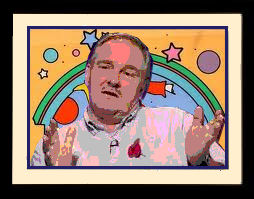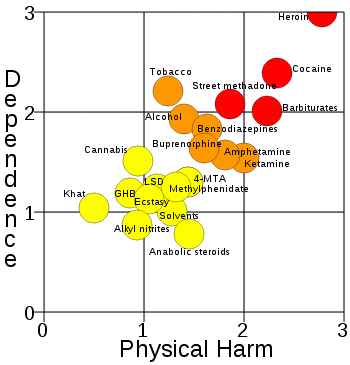There is an irony in this story. Dr. Nutt himself was a truth-sayer. In 2008, he became Chairman of the Advisory Council on the Misuse of Drugs. He was an outspoken advocate for basing the laws about street drugs on their true evidence-based dangers – publishing this graph in The Lancet:In 2009, Dr. Nutt was fired from this appointment because of his own truth-saying about Street Drugs [and one has to wonder where the prescription medications Nutt both promotes and defends would fall on his own graph].
 I’m sure I’m not the first person to wonder about the relationship between the sixties’ drug culture and the later preoccupation of psychiatry with psychopharmacology, so I found Nutt’s position interesting. He is a past president of the British Association of Psychopharmacology and of the European College of Neuropsychopharmacology. He is the president of the British Neuroscience Association and vice-president of the European Brain Council. Dr. Nutt hardly has the look and feel of a latter-day hippie.
I’m sure I’m not the first person to wonder about the relationship between the sixties’ drug culture and the later preoccupation of psychiatry with psychopharmacology, so I found Nutt’s position interesting. He is a past president of the British Association of Psychopharmacology and of the European College of Neuropsychopharmacology. He is the president of the British Neuroscience Association and vice-president of the European Brain Council. Dr. Nutt hardly has the look and feel of a latter-day hippie.
-
MDMA and C4’s ‘Drugs Live’
One final point that I feel also needs a brief mention is that this programme may also reinforce some other potentially unhealthy behaviours, notably amongst scientists and psychiatrists [who are generally not the same creature]. The treatment of serious mental health problems has a very dark history, which has seen the reduction of distress to the language of receptors and neurotransmitters, and the portrayal of pharmacology as the way forward. In recent years the poverty of direct evidence for neurochemical imbalances in the brains of people with mental ill-health diagnoses, and of the relative weaknesses of the chemical cure [especially for schizophrenia and depression] have shown the flaws in the standard psychiatric/medical model of managing such problems. These trials with MDMA, though interesting, are also worrying from this perspective too; in part continuing this drug-focussed tradition, obsession perhaps, of those charged with helping us navigate madness.
Magic mushroom depression therapy prepped for controversial clinical trial
FiercePharma
By John Carroll
October 1, 2012David Nutt, a prominent and often controversial investigator at Imperial College London, has landed about $800,000 from the U.K.’s Medical Research Foundation to test the active ingredient in "magic mushrooms" as a possible new treatment for depression. Working with the knowledge that psilocybin has been linked to long-term relief for cases of serious depression, Nutt has lined up a manufacturer able to produce a dose that can be injected in about 30 patients. Investigators will take brain scans of the volunteers to help determine how the therapy works.Three years ago, Nutt was bounced out of his role as chairman of the U.K. government’s advisory council on drugs after making some controversial remarks on the relative dangers of ecstasy. And it hasn’t been easy getting to this stage of his work on psilocybin, relying heavily on help from supporters. Even if the drugs works in the trial, there’s a major hurdle between his treatment and any kind of marketed product: It’s an illegal substance. "One of the things to change in parallel with the trial is the law," he told The Financial Times. "Otherwise the big problem is if it works, no one will be able to prescribe it."


Ah. Discontinuation Syndrome. That’s when a person’s brain has adapted to a drug so that when the drug is discontinued the brain needs time to adapt to the lack of the drug; which is— I’m sure of it— withdrawal from a drug that one is addicted to.
Monty Python might have consulted on naming the European College of Neuropsychopharmacology.
The idea of ketamine as a therapeutic agent always makes me laugh. But then, giving legal speed to children and then decrying their trading it in college — oh, how the drug culture has changed.